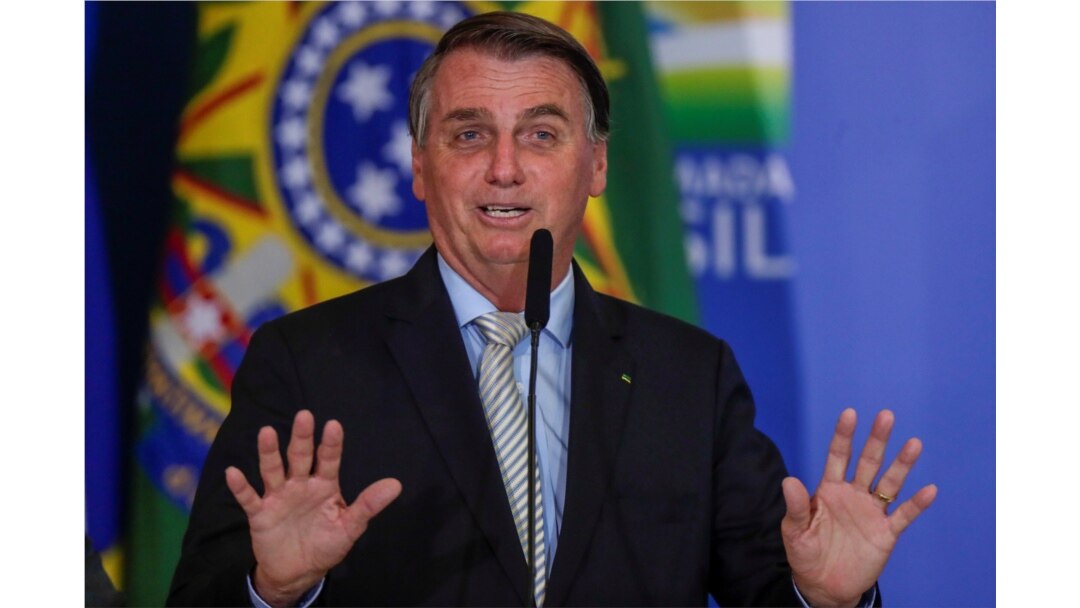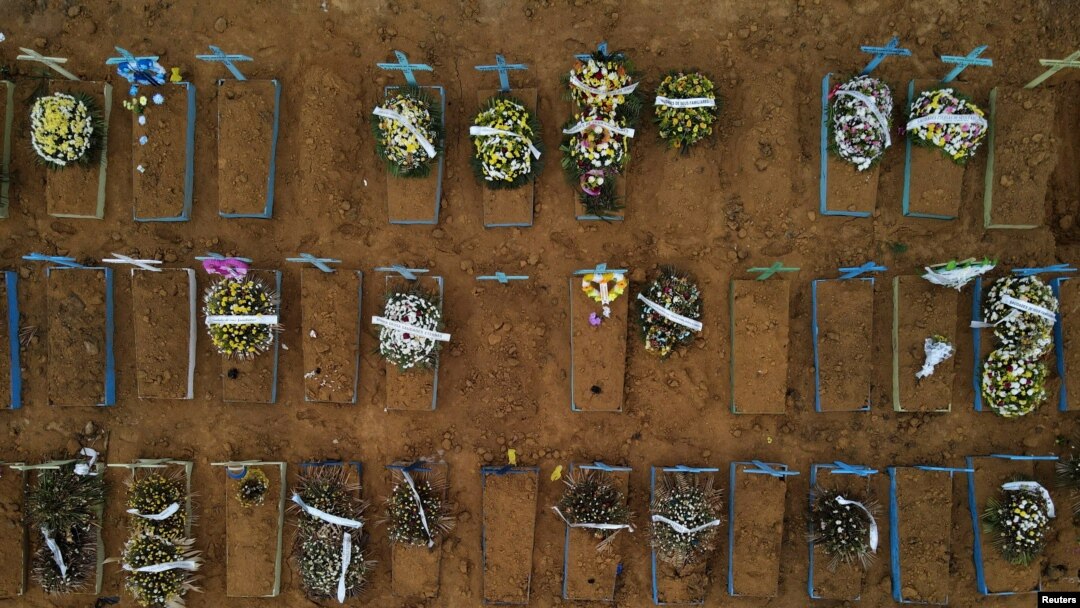Brazil marked one year since its first confirmed case of the coronavirus on Thursday — the same day it recorded a quarter of a million deaths from the disease the virus causes.
The country has averaged roughly 1,000 deaths from COVID-19 daily in recent weeks — similar to the peak of the virus in the country last July, according to statistics from the country’s ministry of health.

Brazil's President Jair Bolsonaro gestures at the Planalto Palace in Brasilia, Brazil, Feb. 24, 2021.
President Jair Bolsonaro, who fell ill with COVID-19 last year, has repeatedly downplayed the seriousness of the virus and has said he will not be vaccinated against it. Brazil has confirmed more than 10 million cases of COVID-19, the disease caused by the coronavirus, according to the Johns Hopkins University Coronavirus Resource Center. It has the second-highest death rate in the world, following the United States.
Roughly five weeks after the first shot against the virus was administered in Brazil, the country has vaccinated about 3.6% of its population, according to Our World in Data, a research site.
COVAX
Also Thursday, the U.N. Children’s Fund announced that the COVAX facility for coronavirus vaccines will soon get access to 170 million doses of AstraZeneca’s vaccine.
The COVAX facility aims to ensure at least 2 billion vaccine doses are available to 85 of the world’s poorest countries. UNICEF said Thursday that deliveries of the vaccine would begin in the first quarter of 2021.
Two other vaccine makers, Pfizer and the Serum Institute of India, are also providing their vaccines to COVAX for distribution.
Vaccine effectiveness
In other COVID-19 news, a new study finds the Pfizer-BioNTech vaccine is as effective in real-world use as it was during its late-stage clinical trials.
FILE - A man receives a coronavirus vaccine from medical staff at a COVID-19 vaccination center in Ramat Gan, Israel, Jan. 3, 2021.
In a large-scale study of 1.2 million people, researchers at Israel’s Clalit Research Institute found the two-dose vaccine reduced symptomatic cases of COVID-19 by 94% across all age groups and reduced severe illnesses by 92%. Researchers also found that a single shot of the vaccine was 57% effective after just two weeks.
The peer-reviewed study, published Wednesday in The New England Journal of Medicine, is the first analysis of a national COVID-19 vaccination strategy.
Late-stage clinical trials of the Pfizer-BioNTech showed the vaccine was 95% effective in combating the novel coronavirus.
South African variant
Meanwhile, Moderna says it has developed a new version of its two-dose vaccine targeted to combat the COVID-19 variant first identified in South Africa. The U.S.-based pharmaceutical company has sent a small amount of the new version to the U.S. National Institutes of Health for additional study.
Moderna is also testing whether to add a third booster shot to its current two-dose regimen to determine whether it can create the immunity needed to fight the South African variant.
Vaccine production
Both Pfizer and Moderna say they plan to increase their output of vaccine within the next few months, with Pfizer doubling its output to 13 million doses per week by mid-March, and Moderna hoping to deliver 40 million doses per month by April.
European Union leaders met Thursday via videoconference to discuss ways to improve the slow pace of the production and distribution of COVID-19 vaccines. Concerns are growing among the 27-member regional bloc that the fast-spreading variants recently detected in Britain and South Africa will be resistant to the new vaccines.
Summer Olympics
In Japan, organizers of the postponed Tokyo Summer Olympic Games are placing a number of coronavirus-related restrictions on spectators coming out to witness the traditional relay of the Olympic torch.
The relay will begin March 25 in the northwestern prefecture of Fukushima, site of the March 2011 nuclear disaster triggered by an earthquake and subsequent tsunami.
A man wearing a protective mask to help curb the spread of the coronavirus walks near the banner for the Tokyo 2020 Olympic Games in Tokyo, Feb. 25, 2021.
Yukihiko Nunomura, vice director general of the Tokyo 2020 organizing committee, announced Thursday that spectators would be required to wear masks and would not be allowed to eat or drink, except for water to avoid heatstroke. Cheering and shouting will also be banned, but spectators can clap as the torch relay passes by.
Organizers say spectators will be required to preregister for a spot at each relay point to witness the torch’s arrival, but Nunomura said the relay could be stopped if too many spectators gathered along the route.
The 2020 Tokyo Olympics were postponed for a year as the novel coronavirus outbreak evolved into a global pandemic. However, recent public opinion polls indicate an overwhelming majority of Japanese believe the games should be postponed again or canceled, with Tokyo and other areas under a state of emergency to quell a surge of new infections.
The opening ceremony for the postponed Tokyo Games is scheduled to be held on July 23.


